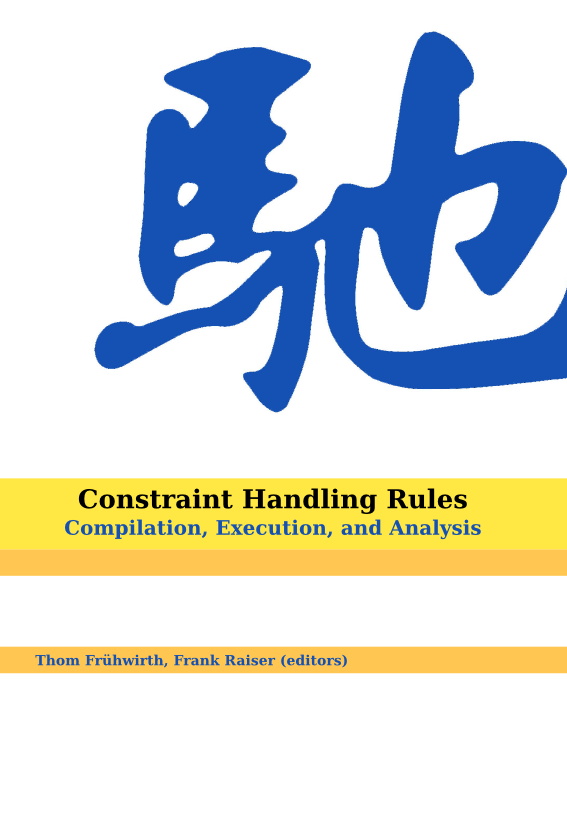Constraint Handling Rules
Compilation, Execution, and Analysis
Thom Frühwirth,
Frank Raiser (editors)
Textbook, ISBN 978-3-83-911591-6, March 2011.
Buy worldwide, e.g. at
amazon.de
eBook-Edition available in Germany, for Kindle at
amazon.de,
at iTunes,
as epub at e.g.
buecher.de
|

|
"...one of the most powerful multiset rewriting languages."
Professor Kazunori Ueda, Waseda University, Japan, and Norio Kato in
'Programming Logical Links'
|
"...a powerful, highly
optimized, lazy rule engine [...] consistently
outperforms Rete-based systems."
Peter Van Weert, K.U. Leuven, Belgium, in 'Efficient Lazy Evaluation of Rule-Based Programs'
|
"has the potential to become a lingua franca, a hub which
collects and dispenses research efforts from and to the various related fields."
Jon Sneyers, K.U. Leuven, Belgium, in 'Optimizing Compilation and Complexity of CHR'
|
"perfectly suitable for high level design of constraint systems"
Marco Alberti and Evelina Lamma, Universita degli Studi di Ferrara, Italy, in
'Merging Views into CSPs: an Application for Computer Vision'
|
Constraint Handling Rules (CHR) is both a versatile theoretical formalism based on logic and an efficient practical high-level programming language based on rules and constraints.
Procedural knowledge is often expressed by if-then rules, events and actions are related by reaction rules, change is expressed by update rules. Algorithms are often specified using inference rules, rewrite rules, transition rules, sequents, proof rules, or logical axioms. All these kinds of rules can be almost directly written in CHR.
The clean logical semantics of CHR facilitates non-trivial program analysis and transformation. About a dozen implementations of CHR exist in Prolog, Haskell, Java, and C. CHR is also available as WebCHR for online experimentation with more than 40 example programs. More than 100 academic and industrial projects worldwide use CHR, and more than 200 books and 1000 research papers reference it.
Visit constraint-handling-rules.org for more information.
This book presents recent research in implementation, extensions, and
novel analyses of CHR.
In order to be self-contained, it starts with an introduction to CHR, which in the
spirit of this book, is held concise and research-oriented. After that,
carefully selected chapters from recent PhD theses provide detailed information
on the topics compilation and optimization, execution strategies, and formal
analysis of CHR. These chapters can be read individually based on the reader's
interest.
The chapters have been edited by Thom Frühwirth and Frank Raiser to better
suit the book's general theme. Additionally, the book has been reviewed by the
individual authors of the chapters, the editors, and Florian Geiselhart and
Johannes Langbein. The involved PhD theses range from 2005 up to the latest
theses available at the time of writing, resulting in the following list of
authors:
- Gregory J. Duck
- Leslie De Koninck
- Edmund S. L. Lam
|
- Frank Raiser
- Tom Schrijvers
- Jon Sneyers
|
| Foreword (pdf) |
| Part I. Introduction to CHR |
| 1. Constraint Handling Rules |
| Part II. Implementation and Optimization of CHR |
| 2. Basic Compilation |
| 3. The K.U. Leuven CHR System |
| Part III. Execution Strategies |
| 4. Rule Priorities |
| 5. Concurrent CHR |
| Part IV. Formal Analysis of CHR |
| 6. Computational Complexity |
| 7. Complexity Analysis of CHRrp Programs |
| 8. A Complete and Terminating Operational Semantics |
| 9. Abstract Interpretation |
| Appendix, Index (pdf) |
Complete table of contents (pdf)
